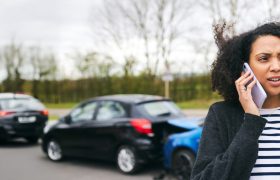Living, working, and traveling in an area prone to natural disasters can be challenging. While the basics of emergency preparedness are likely second nature to residents, there’s always room to enhance your readiness and improve your ability to withstand the unpredictable forces of nature. For travelers, we offer some suggestions to help you prepare for facing an unexpected disaster while away from home.
Never hesitate to call for help
If you need emergency care during a natural disaster, never hesitate to call 911 or the emergency response line for your area. Emergency transport sometimes has to adapt to disaster conditions, so it may take more time to reach you, but emergency responders get extensive training for situations just like these. In natural disaster situations, emergency responders may need to set up pre-hospital stabilization sites, triage areas, or other temporary care sites to manage the overwhelming amount of injured people. You may need to be transported to one of those sites and stabilized, before being transported to a local hospital. Thankfully, MASA will be ready to cover out-of-pocket costs for your emergency transportation.
Boost your skills and kits when living in disaster prone areas
Upgrade your skills with courses
If there’s a delay in emergency care in the aftermath of a natural disaster — due to obstructed roads, flooding, or other obstacles — you or your family may have to rely on your own emergency care skills until help arrives. Taking a course in CPR and/or first aid (particularly a course that offers training specific to your area) can give you the skills you may need to stabilize yourself, or someone else, in the event of an injury.
Backup your devices and power up with helpful apps
Staying as up to date as possible on weather forecasts and potential hazards for your area is also critical. One way to level up your ability to monitor the situation and maintain access to important information, is to prep a charged, backup mobile device and portable power bank to add to your emergency kit. Add downloaded maps, emergency contact lists, and copies of important documents to your backup device, so you have access to important information even if cellular service is down.
Consider downloading some emergency information apps to your primary and backup mobile device. The American Red Cross apps (iOS or Android) and the FEMA app are great for on-the-go access to severe weather tracking, first aid information, emergency alerts, step-by-step guides and more. Plus, download the MASA app (iOS and Android), so you’ll have quick access to your emergency medical transport coverage and services.
Identify weaknesses through testing
You’ve taken some first aid courses, packed your emergency kit, and made an emergency plan — have you tested everything to make sure it will work when disaster hits? Many make an emergency plan and put together a kit, but few remember to actually test everything out and practice. Organize regular practice drills to test the effectiveness of your emergency plan. Try out different scenarios and use the opportunity to test out the gear in your emergency kit. You’ll be able to identify any weaknesses or areas for improvement, so you can refine your strategies accordingly.
Remember, disasters don’t just hit you at home
What if disaster strikes while you’re away from home? Have you thought about what you might do? If you’re planning travel, consider bringing along a smaller version of your emergency supply kit, as well as your power bank and backup mobile device with helpful digital tools like downloaded maps, the MASA app, and the GDACS app. You can also create a temporary emergency plan and decide on a designated meeting spot for you and others you may be traveling with, in the event that a disaster occurs.
Before you leave, review your MASA coverage on our app or in your member portal online to see what resources are available to you and where they extend. Some MASA plans include repatriation coverage, so if you need continued care after an emergency, we’ll provide coordination services and cover the expenses to transport you to a medical facility near your home. We also offer features like minor child return transportation coverage and pet return transportation coverage, which provide coordination services and cover expenses for the return of your child or pet safely home, should you be hospitalized due to a medical emergency. No matter where you go, you can count on your MASA coverage to protect you from unexpected medical transport costs.
We’re here for you
Here at MASA, we’re in the business of helping you stay prepared for the unexpected. We hope our tips help you more confidently navigate emergencies, so you can increase your chances of staying safe and minimizing the impact on your life. Because being prepared is the best defense against the unpredictable forces of nature.


